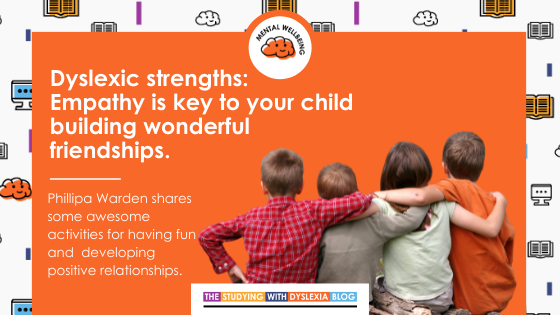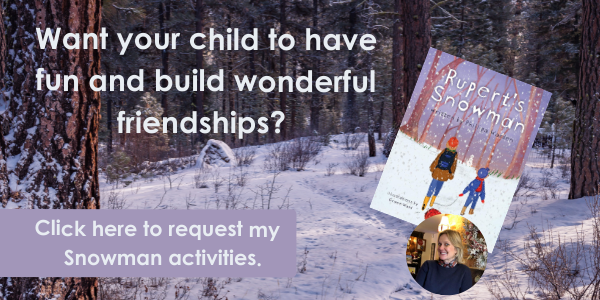I’m Phillipa and I am the mother of two children and I strongly believe that empathy is the key to your child forming wonderful friendships.
I was amazed at the bond that my son had made with his snowman when he refused to return home without it one Christmas Eve. It inspired me to write my first children’s picture book and I remember thinking at the time ‘Wow!’ if he feels like that about three balls of snow how special his real friends must seem to him.
Inspiration from a four year old boy.
Of course at the tender age of four, Rupert felt that the snowman, like his teddy bear, was real. He was worried about Frosty being left out in the cold and could only be comforted once we had dismantled and packed the snowman onto the sledge and rebuilt him along with a snow family at home under the apple tree.
Empathy, a dyslexic strength that is at the heart of building relationships.
Empathy was at the heart of this act, it is an important skill that comes naturally to most people, even children as young as 2. This ability to be aware of, understand and be sensitive to the feelings of others is a key part of forming friendships. Children begin to demonstrate empathy when they copy another person’s behaviour, knowing that it is different from how they are feeling themselves. Being aware of other people's feelings and thoughts and being able to express that understanding through a supportive response forms the basis of long lasting companionship.
Empathy: A skill worth developing.
Although it comes naturally to most, empathy, like kindness, is a social skill that can be learned and practised whilst having lots of fun. We know that play builds imagination and creativity, fosters cognitive growth, improves literacy, encourages greater independence and can promote physical fitness but it also encourages the emotional and benefits that support great friendship.
Inviting someone to play or to a party, agreeing to someone else's choice of game, not leaving people out, helping to build something together, waiting patiently whilst taking turns are just some examples of how being aware of others feelings contribute towards building healthy and respectful friendships. I've developed some useful resources to nurture empathy and encourage friendship, but they aren't lessons with a capital L, your child will just be having a ton of fun.
If you would like to have fun with your children as we approach Christmas and help them to practice empathy to ensure they build wonderful friendships then you might enjoy my activities.
Check out these empathy developing resources.
Inspired by my experience of seeing how my son felt about his snowman, I have developed a range of activities that help a child to understand the world around them as well as the emotional world inside them. Many children with dyslexia have demonstrated excellent relationship skills and these activities only serve to help them to nurture these abilities.



